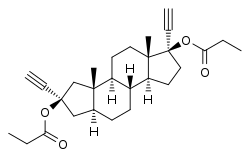Anordrin
Anordrin (former developmental code name AF-53), also known as 2α,17α-diethynyl-A-nor-5α-androstane-2β,17β-diol dipropionate, is a synthetic, steroidal selective estrogen receptor modulator (SERM) which is used in China as an emergency contraceptive.[2][3][4][5][6][7] It is the most commonly used emergency contraceptive in China.[7] The drug is marketed in a combination formulation with mifepristone under the brand name Zi Yun.[8][9][10] Anordrin has not been studied for use or marketed outside of China.[11] It has been used in China since the 1970s.[12][1]
 | |
| Clinical data | |
|---|---|
| Trade names | Zi Yun (with mifepristone) |
| Other names | AF-53; α-Anordrin; Anordrine; 2α,17α-Diethynyl-A-nor-5α-androstane-2β,17β-diol dipropionate |
| Routes of administration | By mouth[1] |
| Drug class | Selective estrogen receptor modulator |
| Pharmacokinetic data | |
| Metabolites | Anordiol |
| Identifiers | |
IUPAC name
| |
| CAS Number | |
| PubChem CID | |
| ChemSpider | |
| CompTox Dashboard (EPA) | |
| Chemical and physical data | |
| Formula | C28H38O4 |
| Molar mass | 438.599 g/mol g·mol−1 |
| 3D model (JSmol) | |
SMILES
| |
InChI
| |
Anordrin has both weak estrogenic and antiestrogenic activity.[2][13][14][15] It binds to the estrogen receptor but does not bind to the androgen receptor or the progesterone receptor.[14][16] In animals, anordrin has antigonadotropic effects, and in male animals, inhibits spermatogenesis and causes atrophy of the epididymis, prostate, and seminal vesicles.[2] It produces a dihydroxylated active metabolite, anordiol, with similar but more potent estrogenic activity.[2][17] The abortifacient effects of anordrin in animals are blocked by supplemental estradiol, suggesting that it is acting as an antiestrogen rather than an estrogen to exert its emergency contraceptive effects.[18]
References
- Chih-ping K, Ming-kang C, Hsiu-chüan C, Shih-hsing C, Ta-wei P, Kang T (1975). "Pharmacological studies of a contraceptive drug anordrin". Sci. Sin. 18 (2): 262–70. PMID 808850.
- Michael Oettel; Ekkehard Schillinger (6 December 2012). Estrogens and Antiestrogens II: Pharmacology and Clinical Application of Estrogens and Antiestrogen. Springer Science & Business Media. pp. 545–. ISBN 978-3-642-60107-1.
- Benno Clemens Runnebaum; Thomas Rabe; Ludwig Kiesel (6 December 2012). Female Contraception: Update and Trends. Springer Science & Business Media. pp. 377–. ISBN 978-3-642-73790-9.
- ANNUAL REPORTS IN MED CHEMISTRY V14 PPR. Academic Press. 14 November 1979. pp. 169–. ISBN 978-0-08-058358-7.
- R.F. Harrison; J. Bonnar; W. Thompson (6 December 2012). Fertility and Sterility: The Proceedings of the XIth World Congress on Fertility and Sterility, Dublin, June 1983, held under the Auspices of the International Federation of Fertility Societies. Springer Science & Business Media. pp. 325–. ISBN 978-94-015-1308-1.
- Liu CQ, Chen BL, Shen SR, Zhang GZ, Dai MZ (1985). "Effects of anordrin and its analogue on antifertility". Contraception. 32 (3): 301–9. doi:10.1016/0010-7824(85)90053-8. PMID 3841308.
- Xiao B (1997). "Abortion and emergency contraception: Chinese experience". Chin. Med. J. 110 (1): 36–42. PMID 9594319.
- Drugs.com. "Anordrin".
- Han X, Weng L, Xiao B (1996). "[Emergency contraception with mifepristone and anordrin]". Zhonghua Fu Chan Ke Za Zhi (in Chinese). 31 (9): 526–9. PMID 9275422.
- Sang G, Shao Q, Zhang L (1999). "[A randomized multicentre clinical trial on different doses of mifepristone alone and in combination with anordrin as emergency contraception]". Zhonghua Fu Chan Ke Za Zhi (in Chinese). 34 (6): 331–4. PMID 11360607.
- Stanley R. Glasser; John D. Aplin; Linda C. Giudice; Siamak Tabibzadeh (14 January 2004). The Endometrium. CRC Press. pp. 711–. ISBN 978-0-203-21903-4.
- Stanley R. Glasser; David W. Bullock (6 December 2012). Cellular and Molecular Aspects of Implantation. Springer Science & Business Media. pp. 31–. ISBN 978-1-4613-3180-3.
- Mehta RR, Jenco JM, Chatterton RT (1981). "Antiestrogenic and antifertility actions of Anordrin (2 alpha, 17 alpha-diethynyl-A-nor-5 alpha-androstane-2 beta, 17 beta-diol 2,17-dipropionate)". Steroids. 38 (6): 679–91. doi:10.1016/0039-128x(81)90086-6. PMID 7336465.
- Mehta RR, Jenco JM, Chatterton RT, Venton D (1982). "Antagonism of the actions of estrogens, androgens and progesterone by anordrin (2 alpha, 17 alpha-diethynyl-A-nor-5 alpha-androstane-2 beta, 17 beta-diol dipropionate)". Steroids. 40 (1): 65–80. doi:10.1016/0039-128x(82)90113-1. PMID 6297127.
- Song S, Chen JK, He ML, Zuo SH, Fotherby K (1987). "Effect of Anordrin on serum levels of sex hormone binding globulin, caeruloplasmin and ovarian function". Contraception. 36 (5): 541–8. doi:10.1016/0010-7824(87)90006-0. PMID 3447815.
- Russeau GG, Quivy JI (1981). "Interaction of A-nor, A, 19-dinor, and A-homo-5 alpha-androstane derivatives with the androgen receptor and the epididymal androgen-binding protein". Steroids. 37 (4): 383–92. doi:10.1016/0039-128x(81)90040-4. PMID 6894653.
- Chatterton RT, Berman C, Walters NN (1989). "Anti-uterotrophic and folliculostatic activities of anordiol (2 alpha,17 alpha-diethynyl-A-nor-5 alpha-androstane-2 beta,17 beta-diol)". Contraception. 39 (3): 291–7. doi:10.1016/0010-7824(89)90061-9. PMID 2714089.
- Mehta RR, Chatterton RT (1991). "Antiovulatory action of anordrin in the cynomolgus monkey (Macaca fascicularis)". Advances in Contraception. 7 (1): 21–8. doi:10.1007/bf01850715. PMID 1872194.